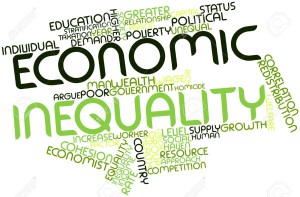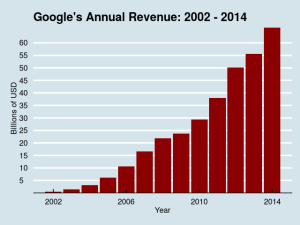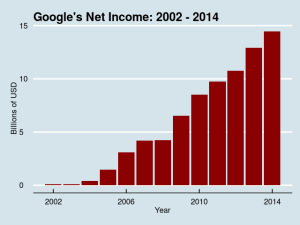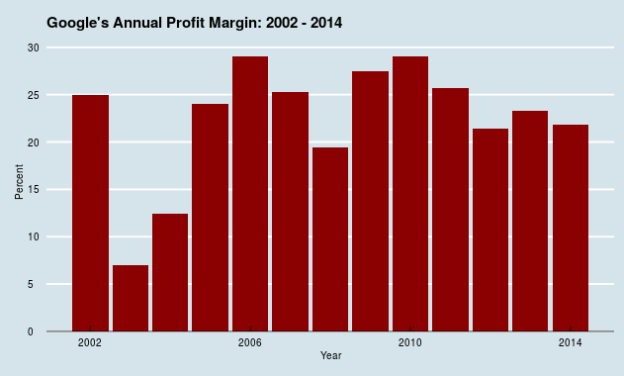 Not without reason, Inequality seems to have taken command of most development, socio-economic and even political discussions. The fact that a supposedly “technical” and long (and excellent too!) book such as Piketty’s Capital in the Twenty-First Century became a best-seller of sorts last year is a good indicator of the relevance of this topic in our current historical juncture.
Not without reason, Inequality seems to have taken command of most development, socio-economic and even political discussions. The fact that a supposedly “technical” and long (and excellent too!) book such as Piketty’s Capital in the Twenty-First Century became a best-seller of sorts last year is a good indicator of the relevance of this topic in our current historical juncture.
The focus of Piketty’s book is inequality regarding income and wealth. But it says little to nothing about the role new technologies can play in this evolution. The fundamental questions here are: is there a connection between the rapid growth of new ICTs and inequality? And if so, what is the role of ICTs in fostering or taming income and wealth inequality?
ICTs are indeed no strangers to inequality. Here, we can detect two overall trends.
First, we have inequality in access to new ICTs. For the last 20 years or so, this has been known as the “digital divide,” a concept that was first used in the United States in the mid-1990s to describe the gap between Information “haves” and “have-nots.” Note that in the US context, the divide was initially circumscribed to schools, and the need to develop new skills to successfully confront the emerging challenges of the then-upcoming “Internet revolution.”
The concept quickly went global and was somewhat simplified to denote the overall lack of access to the new ICTs. On this basis, a plethora of initiatives were undertaken by players from all sectors to close the digital divide, which was relatively more successful in industrialized countries. Today, for example, 25 years after the Internet became public, only 3 billion people are connected – and less than 30% of the total population of developing countries has access. The divide persists then, particularly in developing countries. The story is slightly different if we focus on the diffusion of mobile technologies. But gaps remain despite the hype. In any event, note that while the digital divide has been slowly closing, income and wealth inequality has been rapidly increasing.
The second broad category relates to the impact of the new technologies on work and employment. This is indeed not a new issue as we can historically trace it back to the first industrial revolution and Ned Ludd and his followers’ social reaction soon after that. Technology and innovation foster labor/capital productivity and triggers the  displacement of workers by machines of all kinds while demanding, at the same time, higher skills. Unless other sectors of the economy can absorb the surplus of workers, unemployment will increase, thus fostering more substantial income inequality. Historical evidence suggests that initial unemployment generated by innovation and technology is superseded by new employment opportunities in other sectors of the economy in the medium and long term. The debate here is on how long this process takes and the policies that should be instituted to expedite it. Needless to say, we cannot solve this here.
displacement of workers by machines of all kinds while demanding, at the same time, higher skills. Unless other sectors of the economy can absorb the surplus of workers, unemployment will increase, thus fostering more substantial income inequality. Historical evidence suggests that initial unemployment generated by innovation and technology is superseded by new employment opportunities in other sectors of the economy in the medium and long term. The debate here is on how long this process takes and the policies that should be instituted to expedite it. Needless to say, we cannot solve this here.
In any event, as the global economy becomes more digital throughout, ICTs are now an integral part of most if not all sectors of our economy. By now, most of us have heard about the imminent “robotics” threat looming on the horizon that will apparently leave most of us without a job. Perhaps not…
But there is also a third aspect usually overseen here, which brings the issue of rising inequality vis-a-vis the emergence of new technology companies. In a relatively short period, this set of new enterprises have become multi-billion dollar firms successfully operating on a global scale. CEOs, VCs, top managers, etc. of such companies have already amassed fortunes more than comparable to that of the Rockefellers, Carnegies and Morgans from a century ago – the entrepreneurs of the so-called Gilded Age in the US. If we exclude the financial sector, one could argue that the tech sector is mainly responsible for the economic recovery from the 2008 depression. We have already heard of the winner-take-all-economy and the “superstar” model that aim at explaining these phenomena.
Let us look at some data. The graph on the left depicts Google global revenues (data obtained from Google) for the last 13 years. Revenues, 90% of which come from advertisement, have grown at an average annual rate of 62.3% in the last 10 years. By the end of 2014, Google had 53,600 full-time employees globally and reported a net income of 14.5 billion dollars (see chart below). In contrast, IBM, which we can now see as an “oldie” in this sector, had for that same year over 430,000 full-time employees globally and a net income of 15.8 billion, very close to Google’s (in case you are wondering, Facebook had less than 10 thousand full-time global employees by the end of 2014). Does this mean that Google is almost 100 times more productive than IBM? Not really…
data. The graph on the left depicts Google global revenues (data obtained from Google) for the last 13 years. Revenues, 90% of which come from advertisement, have grown at an average annual rate of 62.3% in the last 10 years. By the end of 2014, Google had 53,600 full-time employees globally and reported a net income of 14.5 billion dollars (see chart below). In contrast, IBM, which we can now see as an “oldie” in this sector, had for that same year over 430,000 full-time employees globally and a net income of 15.8 billion, very close to Google’s (in case you are wondering, Facebook had less than 10 thousand full-time global employees by the end of 2014). Does this mean that Google is almost 100 times more productive than IBM? Not really…
At any rate, we can start to capture some of the traits of the new tech sector. They include:
- Tech firms go global quite rapidly and thrive at that scale, thus the need for “global policies”
- Many tech firms benefit from end-users who contribute free content in exchange for (almost) free access to state of the art tech platforms (this could partially explain the apparent “productivity gap” between Google and IBM)
- Tech firms tend to employ a relatively low number of people
- Tech firms demand new and higher levels of skills from potential employees
- Tech firms can become financially successful in a short period
This provides some new ammunition to reply to our first question on ICTs and increase income and wealth inequality. We can conclude that the answer is a resounding yes, at least for the short term. Bear in mind that the 2008 depression has helped exacerbate economic inequality, so we cannot put all the blame on ICTs.
But on the other hand, we should not be too surprised about this. After all, historical evidence shows that major technological developments and “revolutions” do have this impact if we only focus on a few selected years. The question then is: what is going to happen in the next 10 to 20 years? Can ICTs also help in closing income inequality as part of the institutional processes set in motion by social agents to address this challenge?
We can try to address this next time.
Cheers, Raúl
A Few Selected Useful References (sans Piketty!)
Bessen, James. 2015. Learning by Doing: The Real Connection between Innovation, Wages, and Wealth. New Haven: Yale University Press.
Burnett, Judy, Peter Senker & Kathy Walker. 2009. The Myths of Technology: Innovation and Inequality. New York: Peter Lang.
BrynJolfsoon, Erik & Andrew McAfee. 2014. The Second Machine Age: Work, Progress, and Prosperity in a Time of Brilliant Technologies. New York: W. W. Norton & Co.
Cozzens, Susan & Djanaraj Thakur. 2014. Innovation and Inequality: Emerging Technologies in an Unequal World. Northampton: Edward Elgar.
Cudworth, Erika, Peter Senker & Kathy Walker. 2013. Technology, Society and Inequality: New Horizons and Contested Futures. New York: Peter Lang.
Frank, Robert H. & Philip J. Cook. 1995. The Winner-Take-All Society: Why the Few at the Top Get Sp Much Than the Rest of Us. New York: Penguin Books.
Freeland, Chrystia. 2012. Plutocrats: The RIse of the New Global Super-Rich and the Fall of Everyone Else. New York: Penguin Books.
Freeman, Christopher, John Clark & Luc Soete. 1982. Unemployment and Technical Innovation: A Study on Long Waves and Economic Development. WestPort, CT: Greenwood Press.
Freeman, Chris & Luc Soete. 1994. Work for all or Mass Unemployment: Computerised Technical Change into the 21st Century. London: Pinter Publishers.
Galbraith, James K. 2012. Inequality and Instability: A Study of the World Economy Just Before the Great Crisis. New York: Oxford University Press.
Lundberg, Ferdinand. 1968. The Rich and the Super-Rich: A Study in the Power of Money Today. New York: Lyle Stuart, Inc.
Milanovic, Branko. 2011. The Haves and the Have-Nots: A Brief and Idiosyncratic History of Global Inequality. New York: Basic Books.
Sennett, Richard. 2006. The Culture of the New Capitalism. New Haven: Yale University Press
Stiglitz, Joseph. 2012. The Price of Inequality. New York: W. W. Norton & Co.
Wilkinson, Richard & Kate Pickett. 2009. The Spirit Level: Why Greater Inequality Makes Societies Stronger. New York: Blumsbury Press.

